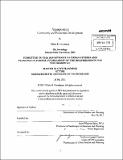| dc.contributor.advisor | Anne Whiston Spirn. | en_US |
| dc.contributor.author | Goodman, Elisha R. (Elisha Renee) | en_US |
| dc.contributor.other | Massachusetts Institute of Technology. Dept. of Urban Studies and Planning. | en_US |
| dc.date.accessioned | 2011-11-18T21:04:34Z | |
| dc.date.available | 2011-11-18T21:04:34Z | |
| dc.date.copyright | 2011 | en_US |
| dc.date.issued | 2011 | en_US |
| dc.identifier.uri | http://hdl.handle.net/1721.1/67227 | |
| dc.description | Thesis (M.C.P.)--Massachusetts Institute of Technology, Dept. of Urban Studies and Planning, 2011. | en_US |
| dc.description | Cataloged from PDF version of thesis. | en_US |
| dc.description | Includes bibliographical references (p. 97-100). | en_US |
| dc.description.abstract | This thesis provides a cash flow analysis of an aquaponics system growing tilapia, perch, and lettuce in a temperate climate utilizing data collected via a case study of an aquaponics operation in Milwaukee, Wisconsin. Literature regarding the financial feasibility of aquaponics as a business is scant. This thesis determines that in temperate climates, tilapia and vegetable sales or, alternatively, yellow perch and vegetable sales are insufficient sources of revenue for this aquaponics system to offset regular costs when grown in small quantities and when operated as a stand-alone for-profit business. However, it is possible to reach economies of scale and to attain profitability with a yellow perch and lettuce system. Moreover, there may be ways to increase the margin of profitability or to close the gap between income and expense through such things as alternative business models, value adding, procuring things for free, and diversifying revenue streams. Any organization or individual considering an aquaponics operation should conduct careful analysis and planning to determine if profitability is possible and to understand, in the instance that an aquaponics operation is not profitable, if the community and economic development benefits of the system outweigh the costs. Keywords: aquaponics, fish, tilapia, perch, lettuce, farming, closed-loop systems, community development, economic development, cash flow analysis, sustainability, economic viability, hydroponics, recirculating aquaculture systems, integrated aquaculture, integrated agriculture, worker-owned cooperatives, agroecology. | en_US |
| dc.description.statementofresponsibility | by Elisha R. Goodman. | en_US |
| dc.format.extent | 100 p. | en_US |
| dc.language.iso | eng | en_US |
| dc.publisher | Massachusetts Institute of Technology | en_US |
| dc.rights | M.I.T. theses are protected by
copyright. They may be viewed from this source for any purpose, but
reproduction or distribution in any format is prohibited without written
permission. See provided URL for inquiries about permission. | en_US |
| dc.rights.uri | http://dspace.mit.edu/handle/1721.1/7582 | en_US |
| dc.subject | Urban Studies and Planning. | en_US |
| dc.title | Aquaponics : community and economic development | en_US |
| dc.type | Thesis | en_US |
| dc.description.degree | M.C.P. | en_US |
| dc.contributor.department | Massachusetts Institute of Technology. Department of Urban Studies and Planning | |
| dc.identifier.oclc | 759095898 | en_US |
